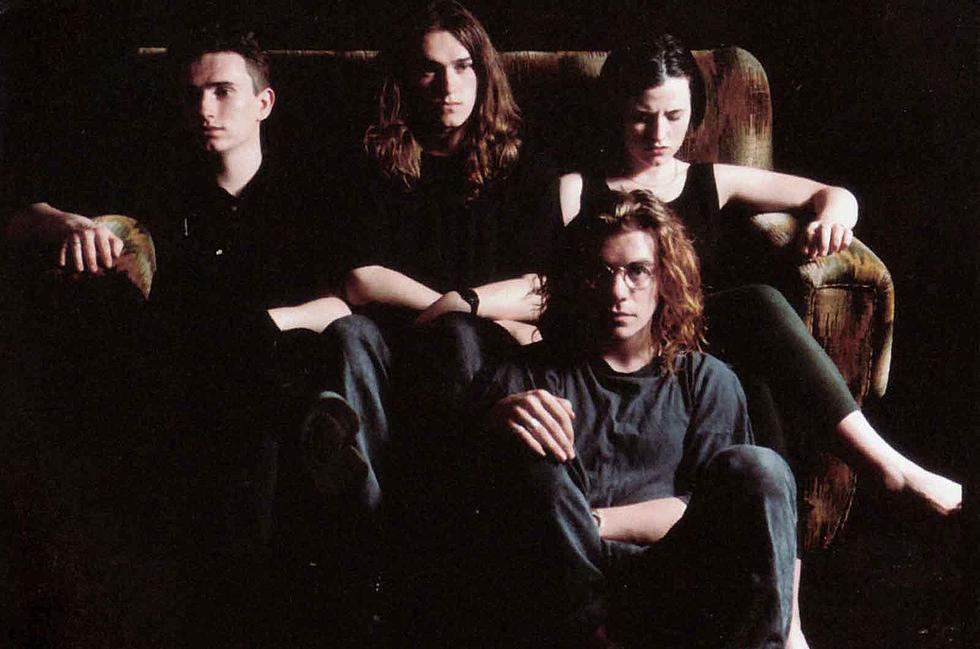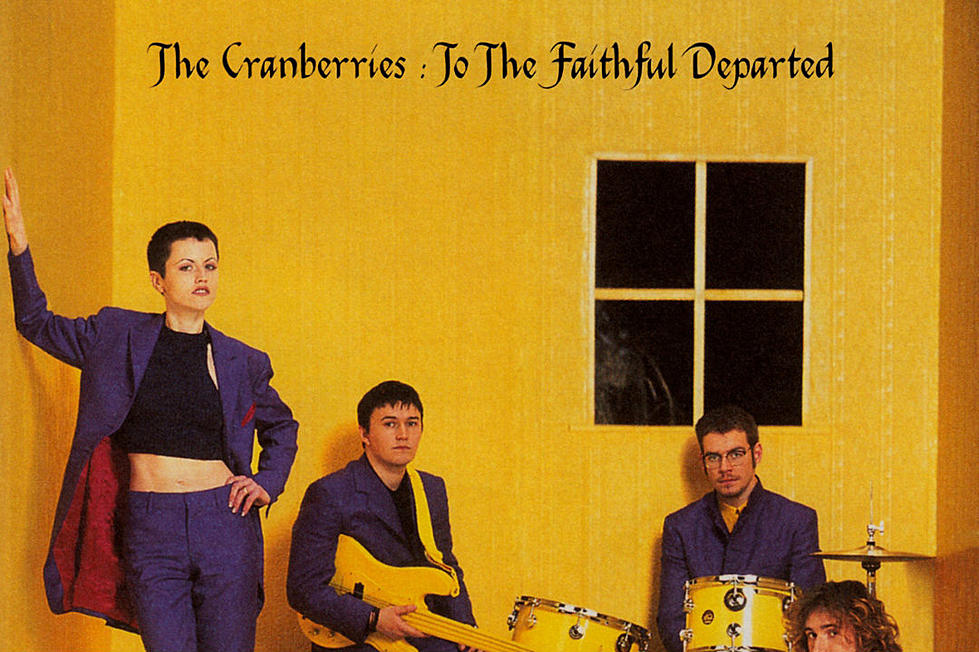Dolores O’Riordan Poured Her Pain and Rage Into the Cranberries’ ‘Zombie’
The Cranberries' "Zombie" was catchy, but aggressive – a human reaction to violence. It was also a ferocious political response, partially expressed through angry yodeling. In a sea of early '90s grunge, "Zombie" fit in. But for the Cranberries, it stood out. The song was a ball of contradictions that became a No. 1 alternative radio hit.
"Zombie" began quietly at frontwoman Dolores O'Riordan's home in Limerick, Ireland. In a lull between tours, she sat up late one night with her acoustic guitar in hand, and began writing. The chorus came to her first. From the start, however, O'Riordan knew it wouldn't be one of the sweet ballads fans expected from them following their 1993 debut, LP Everybody Else Is Doing It, So Why Can't We?
They'd made a name for themselves on that album, with songs like "Dreams" and "Linger" that initially failed to attract attention, but rose on the charts when they went into heavy rotation on MTV. But fans looking for more ethereal pop music with a Celtic lilt were in for a surprise when they heard the lead single to the Cranberries' follow-up record No Need To Argue.
The song had its roots in youth, sadness and good old-fashioned anger. It was a response to the events of March 20, 1993, and a tribute to its victims. On that day, a bomb was planted in a Warrington trash bin by the IRA, killing 3-year-old Jonathan Ball; 12-year-old Tim Parry succumbed to his injuries days later. Dozens more were injured.
Parry's father Colin described the song as "both majestic and also very real." For O'Riordan, the incident hit her on a number of levels.
"I remember seeing one of the mothers on television, just devastated," she said in 1994. "I felt so sad for her, that she'd carried him for nine months, been through all the morning sickness, the whole thing and some … prick, some airhead who thought he was making a point, did that."
The random nature of the conflict instilled fear, too. "I remember at the time there were a lot of bombs going off in London and the Troubles were pretty bad,” O'Riordan recently said of the Northern Ireland conflict that began in the '60s. "These bombs are going off in random places. It could have been anyone, you know?"
Perhaps most of all, she was offended that the atrocities were carried out in the name of Ireland. "The IRA are not me. I'm not the IRA," O'Riordan told Vox in 1994. "The Cranberries are not the IRA. My family are not. When it says in the song, 'It's not me, it's not my family,' that's what I'm saying. It's not Ireland, it's some idiots living in the past."
So, she brought what she had written to a rehearsal with the band, and molded it into something less quiet and more befitting its subject.
"I picked up the electric guitar. Then I kicked in distortion on the chorus, and I said to [drummer] Ferg [Lawler], 'Maybe you could beat the drums pretty hard?'" O'Riordan told Team Rock last November. "Even though it was written on an acoustic, it became a bit of a rocker."
The Cranberries later recorded the song in Dublin, with producer Stephen Street at the helm. Street worked on the guitar sound for some time, experimenting with feedback and distortion, but O'Riordan remembered it as an organic process, and not an attempt to hop on the grunge bandwagon. Regardless of the reason, it worked in an era that was embracing anger and rage.
Listen to the Cranberries' Acoustic Version of 'Zombie'
"Zombie" reached No. 1 in the U.S., and attained platinum sales in Australia and Germany; the Cranberries sold 7 million copies of No Need to Argue on the strength of the single. It bested Michael Jackson and TLC for best song at the 1995 MTV Europe Music Awards. The band was even invited to perform at the Nobel Peace Prize ceremony in 1998, when Ulster Unionist leader John Hume and Social Democratic and Labour Party leader David Trimble received the honor “for their efforts to find a peaceful solution to the conflict in Northern Ireland.”
But in the U.K., "Zombie" peaked at No. 14, likely both buoyed and stymied by the song's video. Samuel Bayer, the director of videos for Nirvana's "Smells Like Teen Spirit" and Blind Melon's "No Rain," took on "Zombie" as well. It interspersed snippets of the Cranberries playing and a gold-painted O'Riordan singing in front of a giant cross. Bayer paired it all with footage footage of soldiers and children in the streets which he had filmed himself on a trip to Ireland.
“I actually thought the director was very brave," O’Riordan told Team Rock. “When he got back, he was pretty pumped; there was a lot of adrenalin pumping through him. He was telling me how tense it was and how he was blown away by the whole thing. He got footage of the kids jumping from one building to another, and he got a lot of footage of the army. He was a very good director.”
But some of the children he filmed were holding guns, and the video was ultimately banned by the BBC and the RTE, Ireland's national broadcaster. They instead ran with an edited version that focused on the band's performance, a clip that the Cranberries essentially disowned.
Meanwhile, the official video would eventually be watched more than 660 million times on YouTube. An acoustic version, recorded for the Cranberries' greatest-hits collection Something Else, followed in 2017.
“It’s a tough thing to sing about, but when you’re young you don’t think twice about things, you just grab it and do it," O’Riordan said last year. "As you get older you develop more fear and you get more apprehensive, but when you’re young you’ve no fear. We did [the acoustic update] with a quartet, so it’s a lot tamer but it’s still nice. It’s interesting to do acoustic versions of your songs because it kind of shows that they can stand acoustically as well: Is it a good song? Has it a good chorus? Has it a good verse? Does it have a bridge? I think when you’re young you have lots of aggression. When you get older it kind of goes away, you get a bit more laid-back. It was fun to go back to it.”
"Zombie" has been covered many times by other artists. Alternate versions include a Spanish-language version by Ororo that was also released in 1994, and a 1995 Eurodance cover by the Italian quartet A.D.A.M. In 2011, Christina Parie covered the song on X Factor Australia, which put it back on the charts, and English singer Sarah Jezebel Deva released a version on her second album. In 2017, "Zombie" got the hardcore treatment in the Netherlands from Ran-D; rapper Eminem also sampled the chorus in his song "In Your Head."
The band Bad Wolves were planning to re-record the song with O'Riordan in early 2018, but she passed away in her hotel room just hours before the session was to occur.
How 50 of Alternative Rock's Biggest Bands Got Their Names
More From Diffuser.fm









